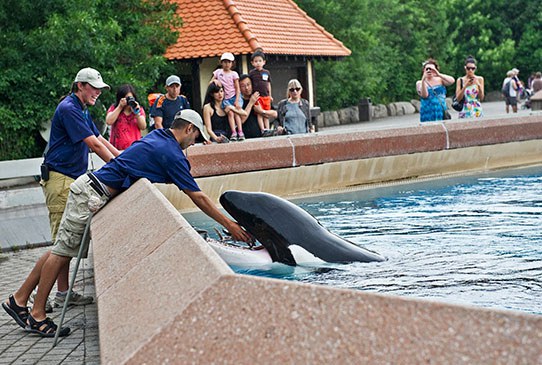
NIAMH SCALLAN / TORONTO STAR FILE PHOTOS
A report by a team of scientists led by David Rosen, from the University of British Columbia, says: “It is our opinion that the present standards of care that apply to marine mammals in public display facilities are insufficient.”
The Ontario government will announce on Tuesday a massive overhaul of conditions for captive marine mammals that include an outright ban on the acquisition and sale of killer whales.
The overhaul, to be announced by Community Safety Minister Yasir Naqvi, is based on a 125-page report by a team of scientists led by David Rosen, a marine mammal expert from the University of British Columbia.
Naqvi called Rosen’s report the “driver” for upcoming changes.
In a nutshell, the report concludes: “It is our opinion that the present standards of care that apply to marine mammals in public display facilities are insufficient.”
In fact, it says, “there are no additional specific provisions” for marine mammals, other than the general standards of care that apply to all animals under the provincial OSPCA Act.
“This is something that Ontarians expect and these animals deserve,” Naqvi said of stronger protections for marine mammals, including whales, dolphins, sea lions, walruses and seals.
It’s the “right thing to do,” he said.
In a Star investigation into conditions at Marineland Canada, several whistleblowers detailed problems related to animal care at the Niagara Falls park. In the stories, first published in August 2012, these former employees blamed sporadically poor water quality and chronic staffing shortages at the park for the ill health, even death, of animals at the facility.
Marineland denies all allegations. Park owner John Holer has always maintained there were no problems with water quality. He has also said that staffing levels were more than sufficient.
“All our facilities are legal,” Holer told the Star in the summer of 2012. He added: “We take care of the animals — better than I would take care of myself.”
The Rosen report, which is being released Tuesday and was obtained by the Star, noted “considerable media attention and public debate” on the adequacy of current regulations in Ontario, adding that existing standards (such as they are) may be unclear to public facilities.
His report recommends creating an “animal welfare committee” at each facility, reporting to the administrator but operating independently. Responsibilities include:
Naqvi said he will table laws to ban the breeding and acquisition of killer whales and create the welfare committees this spring. As well, he will bring in new rules on care — water quality, pool size, veterinary programs — through regulatory changes within six months.
TARA WALTON/TORONTO STAR
Marineland's Orca Kiska is fed in Friendship Cove in Niagara Falls, Ont., in this 2012 photo.
Madeleine Meilleur, his predecessor in the ministry that oversees animal welfare, announced the creation of the Rosen committee in October 2013. At the time the minister also said the province would set up a voluntary registry for zoos and aquariums
“There is a perception that a lack of transparency exists in the way that marine mammals are managed within display facilities, which contributes to concern for their well-being,” said the report.
Asked if inventories of animal acquisitions, births and deaths will be public, Naqvi said he wants the rules to be transparent and “their implementation to be transparent.”
Rosen’s team started with the premise that “it is generally acceptable for animals to be kept in facilities such as zoos and aquariums.” Within those parameters it’s a wide-ranging, well-researched report.
It raises concerns about the international trade in marine mammals, noting “lax or non-existent regulations” in some places and “inaccurate and fraudulent reporting.”
Naqvi said the OSPCA has promised completion of the new registry of the province’s 62 zoos and aquariums by March. So far, 35 have signed up to the voluntary registry.










